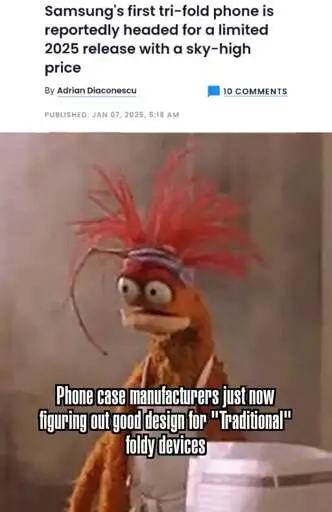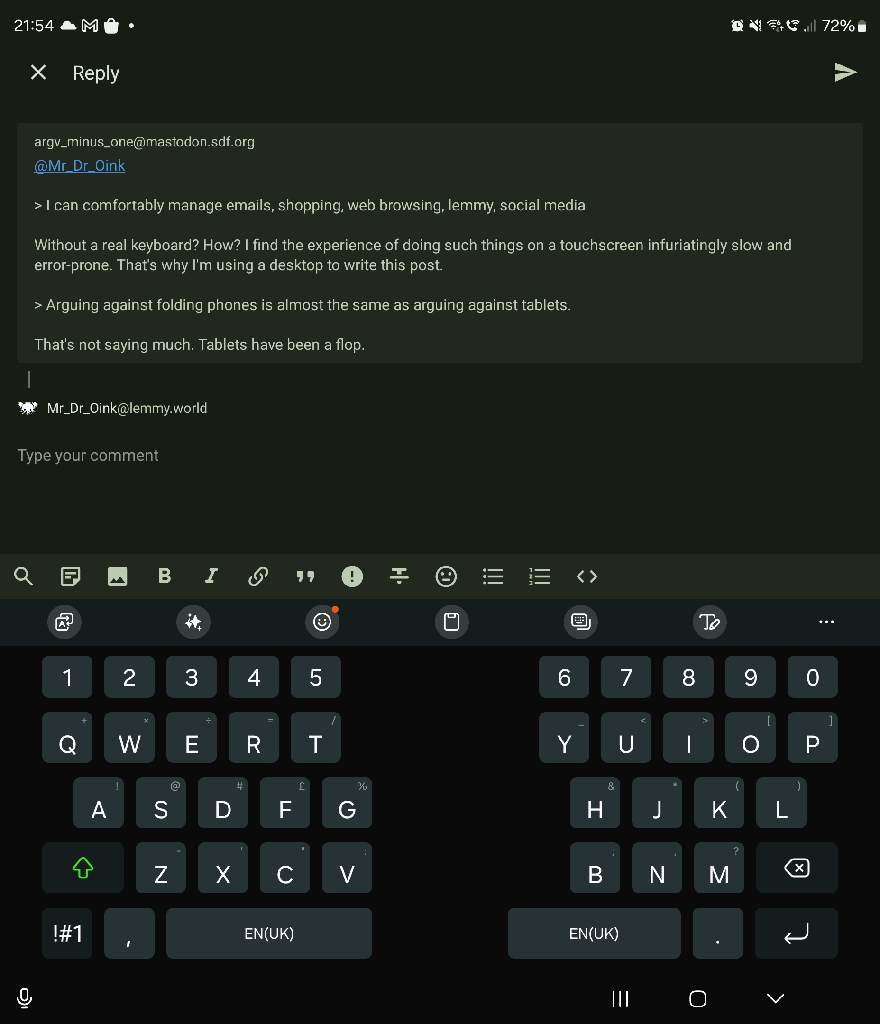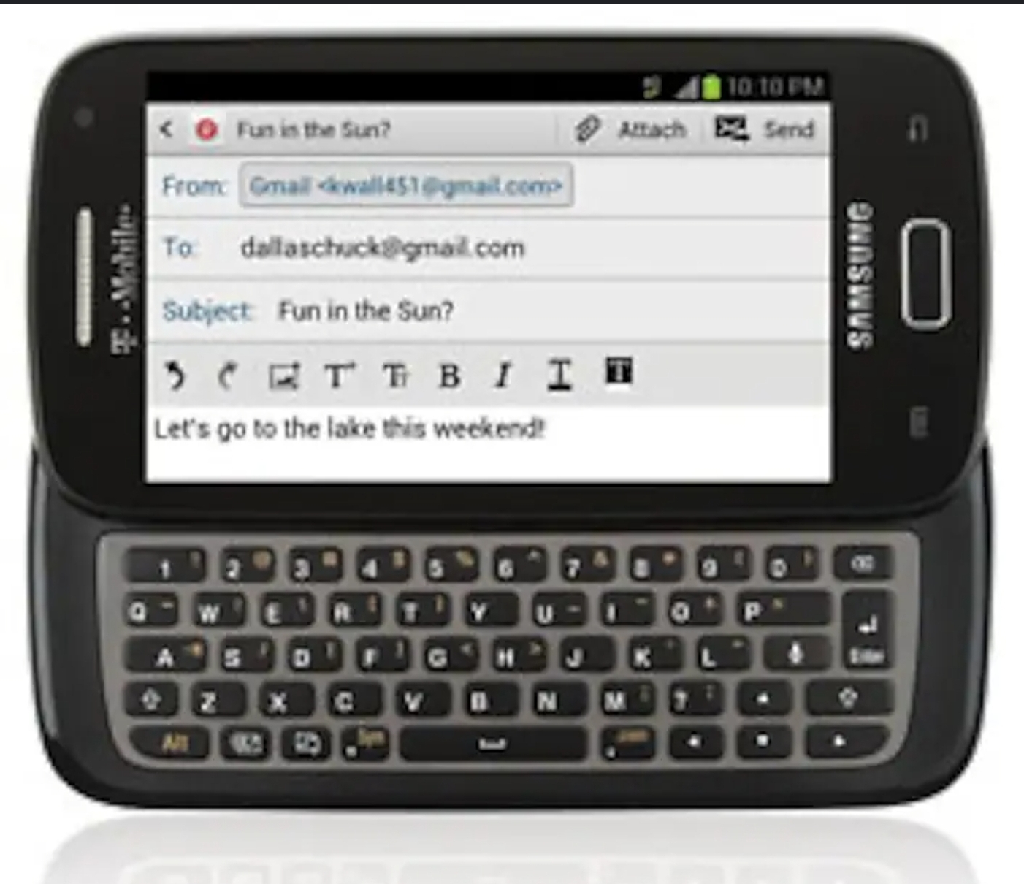Wonder how they'll do with the multi-dimensional foldy phone in 2032
Wonder how they'll do with the multi-dimensional foldy phone in 2032


Wonder how they'll do with the multi-dimensional foldy phone in 2032


You're viewing part of a thread.
I can comfortably manage emails, shopping, web browsing, lemmy, social media
Without a real keyboard? How? I find the experience of doing such things on a touchscreen infuriatingly slow and error-prone. That's why I'm using a desktop to write this post.
Arguing against folding phones is almost the same as arguing against tablets.
That's not saying much. Tablets have been a flop.

Because my keyboard looks like this. It's fast enough, and if you learn how to use shortcuts, suggestions, and cursor control etc its easy in its own way.
Maybe you just dont spend enough time with touchscreens because of your clear disdane for them.
Tablets aren't a flop. Estimates say there are at least 1 billion users worldwide, and they have a lot of niche functionality not provided by laptops, as i have previously mentioned.
Regardless. You, a none foldable user who clearly thinks desktops/laptops are the best user experience and most functional, telling me, a foldable phone user who has both a desktop, and a laptop, and i work in IT on a laptop daily that my foldable is not a perfectly reasonable and legitimate user experience is a bit odd.
I have experience of both, you have experience of one (or so it seems based on your posts) and you are telling me i am wrong about my experience because you dont think it's possible. It's just a bit rich....
I know you might think you dont need to use one to conclude you won't like one. But i contend that after having one as a daily driver for almost 4 years, I could not go back to a non foldable. It would be too restricting.
On the contrary, my disdain for touchscreens is a result of spending far too much time with them. A larger, foldable screen isn't going to solve that problem.
A phone with a real keyboard would solve that problem—I loved my Droid 3 and miss it terribly—but for reasons I absolutely cannot fathom, no phone manufacturer wants to make a truly good phone any more.
I don't know what estimates you speak of, but I manage a website, and the monthly tablet users on it is basically zero.
Sounds like you aren't the market for touch screen devices. Most people get on with them just fine.
A phone with a slide out keyboard with buttons so tiny that only a mouse could use them? Sorry to exaggerate a bit, but it's a 4 inch screen. That keyboard must be awkard. I guess a blackberry would have suited you, too?
The reason they dont make physical keyboards for phones much anymore is be ause they dont work well and people dont like them.
You manage a website? What's your monthly hit count? How many of those users have foldables? Can you rely on the user agent to identify a tablet? Or is it possible that they just appear the same as a phone? Or a foldable? (it is). What if they use desktop mode? do you think your websites number of tablet users is representative of the overall global users?
I used google to determine the number of tablet users globally and averaged a number from multiple sources.
Tbh, it seems like your view is "if it doesn't line up with my preconceived ideas, then it must not be true"
Which isnt a great way to look at things.
The Droid 3 keyboard's keys are larger than a touchscreen keyboard's. You push them with your thumbs. If you can handle a Game Boy/DS/Switch, you can handle that keyboard.
Never used a BlackBerry. Their keyboards seem smaller (i.e. harder to use) than the Droid's.
Does nobody like keyboards on phones? I don't remember anybody surveying me.
Pretty ironic that you think I shouldn't knock foldable phones before I try them, but you're knocking physical keyboards without trying them.
Ok, i assure you, the droid 3's keys are not larger than my foldables keys. And if you push them with your thumbs, then they are not better than a touch screen keyboard for typing speed. They are also more than likely prone to as many errors as a touchscreen keyboard. Muscle memory will play a big role in how well they work for the individual.
Yes, people dont like physical keyboards on phones, or else there would be a market for them, and you would not be complaining about not being able to find any modern phones with physical keyboards. Clearly, they dont satisfy a need that enough people out there have. I think you need to accept that you are in a minority of people who like phones with physical keyboards. Incidentally, a minority smaller than the market share of tablets.
Fair enough, tablet market share is around 2% when compared to mobile and desktop/laptop. pretty low, but high enough that they are still being manufactured and sold.
As for the irony, i have used a phone with a slide out keyboard. It was a samsung from a long time ago, im struggling to remember its name, but it looked a lot like this one:

So i am sticking to that point.
Not even the same ballpark. Typing accuracy with the Droid 3 keyboard is comparable to desktop. Speed is less with only two fingers instead of ten, but its speed × accuracy is still vastly superior to that of a touchscreen keyboard.
Touchscreens have zero tactile feedback. It's a completely flat panel. Touch typing is impossible. Gesture typing is abysmally inaccurate. Hunt-and-peck is abysmally slow.
Yes, I would probably have liked your old Samsung. Looks pretty similar to my Droid 3.
Touch typing (assuming your meaning typing without looking at the keyboard) is not impossible. Im doing it right now..... muscle memory is a big part of it. Dont forget autocorrect and grammar and spelling suggestions do help as well.
Regardless. Who needs touch typing on a phone? You are typing slowly enough to follow exactly what you type without needing to check the text box above to see what you typed.
Let's not pretend that touch typing on a keyboard for thumbs is the same as touch typing on a full-size keyboard. It's waaaay closer to touchscreen typing, especially on my folding phone inner screen.
They may not have tactile feedback, but they do respond with a tiny vibration to show you did hit the key, which is more than enough to alert you if you missed one.
Look, i'm sorry you suck at typing on a touchscreen keyboard, but that doesn't make you right automatically.
And are you just going to forget that you mentioned i have never used a slide out phone keyboard as a point against my argument. but actually i have and now you are just saying you would have liked the samsung one i showed you? Not conceeding anything there? No?
I did say touch typing on a thumb keyboard is slower. I also said it's far faster than what I can do on a (normal non-folding no-physical-keyboard) phone.
If you can touch type on your foldable phone's touchscreen keyboard, where you can't feel the boundaries between the keys, then I'm impressed. I didn't think that was possible.
It's just muscle memory. It's easier with physical keys, but I've used a phone of this shape for over 3 years now, and im using it all the time, so touch typing is just what happens with time.
Maybe playing a musical instrument helps as a lot of that is muscle memory spacial awareness.
Tbh i dont think we should continue this discussion, i would say we just have different needs in our devices. You won't see it my way as my way doesn't meet your needs, and the same goes for me and your needs.
Having said that, i also dont think it's helpful for anyone to decide we know something is bad without personal experience or knowledge of the personal experience of those that have it.
I'm happy to conceed. i came into this ready to argue, but i think it's better not to.
Google Analytics reports how many people are using desktop, phone, or tablet on my site.
A Google search for “tablet vs phone vs desktop market share” yields similar results: tablet market share is very low (though not basically zero like on my site).
I could charitably call tablets a niche device, but seeing as convertible laptops do everything tablets do, have keyboards, and run serious non-toy operating systems, I don't see any reason to be charitable.
You keep calling android/ios a toy operating system. Your bias is showing.
Its not charitable to call tablets niche. It's accurate. The same goes for 2-in-1 "convertable" laptops.
Fact is, if you are arguing that a laptop that doubkes as a tablet is a good device then you are arguing that the need/want and use case for tablets is great enough that they are augmenting laptops into tablets to satisfy that need for consumers.
Going back to the original point. Foldables are good devices that cover a range of needs that are not met by regular phones. You dont need a laptop to do these things, and i can't put a laptop in my pocket and use it absolutely anywhere by just taking it out of my pocket and pressing the power button.
Your insistance on arguing that desktops and laptops are the only way to do anything is just wrong. That is proven by the market share. Desktops have about 35% and phones have about 60%
Its not even close.
No, my desire for autonomy is showing. My Linux PC is my computer and it responds to my decree, as a certain hammy Skyrim character would put it. Android and iOS have the audacity to tell me what I'm allowed to do with my own device, which as far as I'm concerned makes them unserious.
You are of course welcome to disagree with my opinion.
My argument for convertible laptops is that, if you want a tablet for whatever reason, you can have your tablet without the downsides.
1/
But you introduce another number of downsides. "Non-toy" OS's are notoriously bad at touch screen operation, mobile OS's are brilliant at it. Convertable laptops are heavier and have more moving and breakable parts, the batteries dont last as long, the screens are more fragile, they are less widely covered by competant repair services as they are fairly unique in their design, in that they will be harder to get parts for.
Incidentally. Using a custom rom for an android phone mitigates your offence to being "told what you are allowed to do" with your device, and even linux has mobile OS's.
Comparing desktop and phone market share is iffy because a lot of people have both and I don't believe there are any reliable statistics on the subject to use in our debate.
As for foldables, was it not your argument that you'd rather use one in place of a laptop? If it's meant to be just a phone with a bigger screen, I guess that's cool, but I'd still want to have a computer with a real keyboard and operating system available to me.
2/end
No, my argument is that they cover a large number of functions that mean i dont need to lug a laptop around with me everywhere. Of course, i will use a laptop or desktop if i can't do something i need to do on my phone, but it's so rare now that i dont even know if my laptop is charged.
Like i mentioned making music. I will use cubasis (sorry, i said elemennts before. That was the one i have on my pc) to sketch out songs. But use my pc when i need a proper recording. But the convenience of composing on my phone (which would be very hard on a none folding or tablet sized screen) takes the majority of the need for my PC for making music away.
Anyway, you are just telling me that your specific use case means you prefer a full desktop and desktop OS. But your pretentiousness ignores that the majority of people dont need that setup. And whilst my needs might include some niche stuff, many of my needs more closely align with the needs of the many.
In a question of which is better, the device that meets the needs of the majority is best. Unless you are asking which is best for me, in which case a comparison is meaningless. As all of our needs are different in small ways.